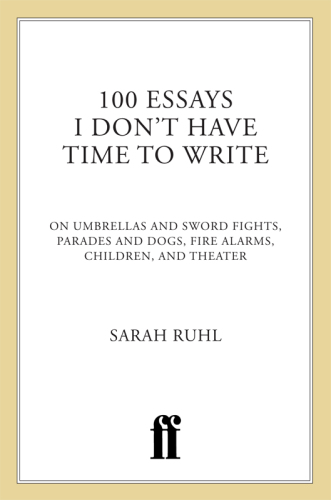
100 Essays I Don't Have Time to Write
On Umbrellas and Sword Fights, Parades and Dogs, Fire Alarms, Children, and Theater
کتاب های مرتبط
- اطلاعات
- نقد و بررسی
- دیدگاه کاربران
نقد و بررسی

June 23, 2014
In these meditations, anecdotes, and stories, award-winning playwright Ruhl (Stage Kiss) hits upon the ideal gimmick for the time-starved author and overburdened reader. Ruhl praises the “beauty of smallness,” showing in pithy probes that “small, forthright words... might have an idea buried in them as large as the most expansive work.” As in her plays, her wide-ranging subjects—some treated in no more than a paragraph, line, or single word—tend to be the subversive. She rallies her readers to “fight the mania for clarity and help create a mania for beauty instead.” Parenting scenes provide the book’s tenderest moments, while discussions of playwriting and theater offer valuable instruction on craft. The two themes converge not just in their similarities—“both parenting and theater involve an embrace of impermanence, and both are embodied art forms”—but also in Ruhl’s belief that theater, playing to the childlike love of illusion, can deliver pure joy. In bold, incisive strokes, she advocates for the creation of art that captures the “humor and the desperation of life,” and for the observation that the tiniest details, in the hope that smallness can “wreak transformation at the most vulnerable, cellular level... in order to banish the goliath of loneliness.”

June 1, 2014
An acclaimed playwright reflects on her art and craft.MacArthur Fellow and Pulitzer nominee Ruhl (Drama/Yale Univ.) is a busy mother of three whose work is often interrupted by her children's needs-for food, say, or "a fake knife to cut...fake fruit." Instead of writing "something totalizing, something grand," she has collected some thoughts on theater: writing plays, acting, watching productions and dealing with "Other People: Directors, Designers, Dramaturgs, and Children." Though she claims that she knows "next to nothing," she notes that theater is not "about knowing, or putting forward a thesis," but about "making knowledge" from the prismatic perspectives of a few characters. Ruhl's essays, generally a page or two, sometimes are much briefer. In "An essay in praise of smallness," she writes, simply, "I admire minimalism." In an essay entitled "Is there an objective standard of taste?" she responds, "No." Several essays consider the power of language. "In the world of imaginary things, speech acts are everywhere," she writes. "One declares the imaginary world into being." For Ruhl, theater depends on physicality rather than psychological analysis. Future playwrights, she maintains, would do well to study juggling rather than literary theory. "Words like 'liminal' and words like 'unpack' should go in essays about theater and get banished from rehearsal rooms," she writes. "Actors used to be akin to prostitutes in the public mind. Now we are akin to professors." The author laments the lack of freedom for a playwright to fail, caused in part by subscription audiences who may "feel that by subscribing, they have been inoculated against failure" and in part by the cost of mounting plays. She also laments the "whitewashed" stage: Casts are predominantly white, unless a playwright specifically calls for a nonwhite actor in a particular role.Ruhl's musings may remind readers of Lydia Davis' aphoristic short stories: fresh, piquant and slyly irreverent.
COPYRIGHT(2014) Kirkus Reviews, ALL RIGHTS RESERVED.

September 1, 2014
Noted playwright Ruhl worried that life, read children, might intrude on her career as a writer. But when she put keystroke to computer screen (twenty-first-century talk for pen to paper), she realized that without children and all of life, there is no writing. Her droll musings begin with those thoughts, plus a random 7 added by her two-year-old son. Is this a collaborative effort then? Not directly. After essay number one, Ruhl manages to keep the littler typists at bay as she waxes philosophical on a crazy array of topics, per the book's title. Each is either directly or tangentially related to the theater, specifically American theater, from writing to staging, acting, and watching. The pieces are of the on-the-run sort, most no more than a couple of pages in length, but no less entertaining for it. All readers, including theater buffs, will appreciate a behind-the-scenes vision of a harried Ruhl, shoeless toddler under one arm, tiny sneakers dangling by shoelaces from her teeth, stubbornly typing these pithy, diverting goodies with the other hand.(Reprinted with permission of Booklist, copyright 2014, American Library Association.)

























دیدگاه کاربران